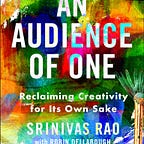5 Daily Habits to Improve your Attention Span
What you spend your limited attention on becomes your life — Courtney Martin
Every day hundreds, if not thousands of things compete for and hijack our attention. Social media, email, pointless internet browsing, text messages, notifications. The list goes on and on. If your attention is focused on these kinds of things, they will become your life.
To the best of my knowledge, nobody has ever said: “I pissed away the whole day on Facebook and today was awesome.” But if we want to be prolific, present, and spend our time on deep meaningful work, our attention is one of our most valuable assets.
1.Treat Attention as a Currency
We would never throw away our money on pointless shit each day. But we seem to have no problem doing that with our attention. Think of it this way. You have a certain number of units of attention each day. Every time you do something that is considered shallow meaningless work, the number of units decreases. Each time you spend time on something that is not shallow, the number of units increases.
2. Meditate
A few weeks ago I spoke with neuroscientist Andrew Hill about the work he’s doing with neurofeedback. It turns out one of the most effective ways to train your attention span is through meditation. And considering that it requires you to focus on one thing (i.e. your breath), while not doing anything else, it would make sense that meditation is a fantastic way to train your attention span.
I built a daily meditation habit by gradually increasing the length of each session. I started with 2 minutes, 5 minutes, then 10, and now I’m up to 15 minutes a day. Try each increment for a week, and then increase the following week. If you seem fidgety and restless at first, that’s completely normal. Eventually, the restlessness will dissipate.
3.Turn off your Phone for an Hour Each Day
I’ve said before that you shouldn’t turn your devices on first thing in the morning. Devices are one of our greatest culprits when it comes to distraction. This is one of the reasons I do a good amount of my writing by hand and still read physical books. It might seem inefficient, but it also forces me to slow down, which is the whole point. It’s also why I’ll occasionally just turn my phone completely off.
Pick a one hour block and turn your phone off for that hour. By turning your phone off, all sorts of things that were competing for your attention no longer are. I guess in some ways you could say this is a form of meditation.
4. Read a Physical Book for an Hour Each Day
Reading physical book forces you to immerse yourself in ONE activity for an extended period of time. And to top it if you read for an hour a day, you might just end up reading 100 books in a year.
5. Shut Down a Few hours Before Bed
In her recent book, The New Better Off : Reinventing the American Dream, Courtney Martin said
At the end of a day spent flitting around the Internet without committing to one task for an extended period of time, I often feel jittery, as if I’ve been throwing back espressos on an empty stomach. In fact, according to Daniel Levitin, multitasking actually creates a dopamine addiction feedback loop — “effectively rewarding the brain for losing focus and constantly searching for external stimulation.” It also increases the production of the stress hormone cortisol, as well as the fight or flight hormone adrenaline. In other words all bad things that make you feel out of control, things anxious, things that make you sick.
If you check email before you go to sleep, and there’s something that can’t be resolved but causes you anxiety, it will impact your sleep negatively. Shutting down a few hours before a bed allows you to tune out the noise, take time for self-reflection, and calm your nerves before you go to sleep.
Of all the things that you could do to become a more prolific writer or creator of any kind, increasing your attention span would be at the top of that list. As somebody who had severe struggles with attention in school and work, these 5 habits have made a huge difference.
Before You Go…
If doing the best work of your life is important to you, you’ll love my free guide: “Optimizing Productivity & Creativity.”
The tactics I’ve packed into this guide allowed me to write over 1 million words in the last 2 years. What could it do for your life’s work? Don’t miss it.
Like the article? Click the 💚 below to share with others on Medium.
